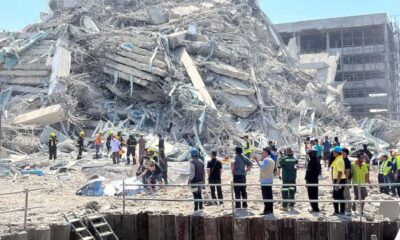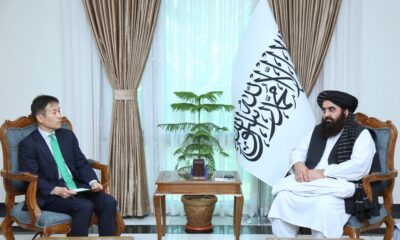World
US criticises Israel on Gaza civilian toll as UN to hear ceasefire demand

U.S. Secretary of State Antony Blinken, in his strongest public criticism of Israel’s conduct of the war on Hamas in south Gaza, said there was a gap between the government’s declared intentions to protect civilians and the casualties.
“As we stand here almost a week into this campaign into the south… it remains imperative that Israel put a premium on civilian protection,” Blinken told a press conference after meeting British Foreign Secretary David Cameron in Washington on Thursday, Reuters reported.
“And there does remain a gap between… the intent to protect civilians and the actual results that we’re seeing on the ground.”
Israel says it must wipe out the Hamas militant group after its attack on Israel two months ago and is doing everything possible to get civilians out of harm’s way, including warnings about military operations.
U.S. President Joe Biden spoke separately by phone with Israeli Prime Minister Benjamin Netanyahu and Jordan’s King Abdullah on Thursday. Biden “emphasized the critical need to protect civilians and to separate the civilian population from Hamas including through corridors that allow people to move safely from defined areas of hostilities,” the White House said.
More than 17,170 Palestinians have been killed and 46,000 wounded, according to the Gaza health ministry, since Oct. 7, when Israel began bombarding Gaza in response to a cross-border rampage by Iran-backed Hamas militants, who control the enclave. The Hamas attack killed 1,200 people, with 240 people taken hostage, according to Israel’s tally.
The Israeli military on Friday said 92 of its soldiers had been killed in Gaza fighting since its ground incursions began on Oct. 20.
Hundreds more Palestinians were killed as Israel fought Hamas militants in the Gaza Strip’s biggest cities on Thursday – 350 people, according to Gaza health ministry spokesperson Ashraf Al-Qidra. Israel said its forces killed a number of gunmen in Khan Younis, including two who emerged firing from a tunnel.
Arab states have renewed their push for an immediate humanitarian ceasefire in Gaza, with United Arab Emirates asking the U.N. Security Council to vote on Friday morning on a draft resolution.
The United States and ally Israel oppose a ceasefire, saying it would only benefit Hamas. Blinken is due to meet top diplomats from Arab states, including Egypt, on Friday in Washington.
The draft was amended to say both “the Palestinian and Israeli civilian populations must be protected in accordance with international humanitarian law” and to “demand the immediate and unconditional release of all hostages.”
A resolution needs at least nine votes in favour and no vetoes by the five permanent members – the United States, Russia, China, France or Britain – to be adopted. The U.S. does not support any further action by the council at this time.
As pressure mounts on Israel over the civilian toll of its war to destroy Hamas, the Palestinian Authority is working with U.S. officials on a plan to run Gaza after the war is over, Bloomberg News reported.
Citing Palestinian Prime Minister Mohammad Shtayyeh, it said the preferred outcome would be for Hamas to become a junior partner under the Palestinian Liberation Organization (PLO), helping to build a new independent state that includes the West Bank, Gaza and East Jerusalem.
“If they (Hamas) are ready to come to an agreement and accept the political platform of the PLO, then there will be room for talk. Palestinians should not be divided,” Shtayyeh said, adding that Israel’s aim to fully defeat Hamas is unrealistic.
World
Putin suggests temporary administration for Ukraine to end war
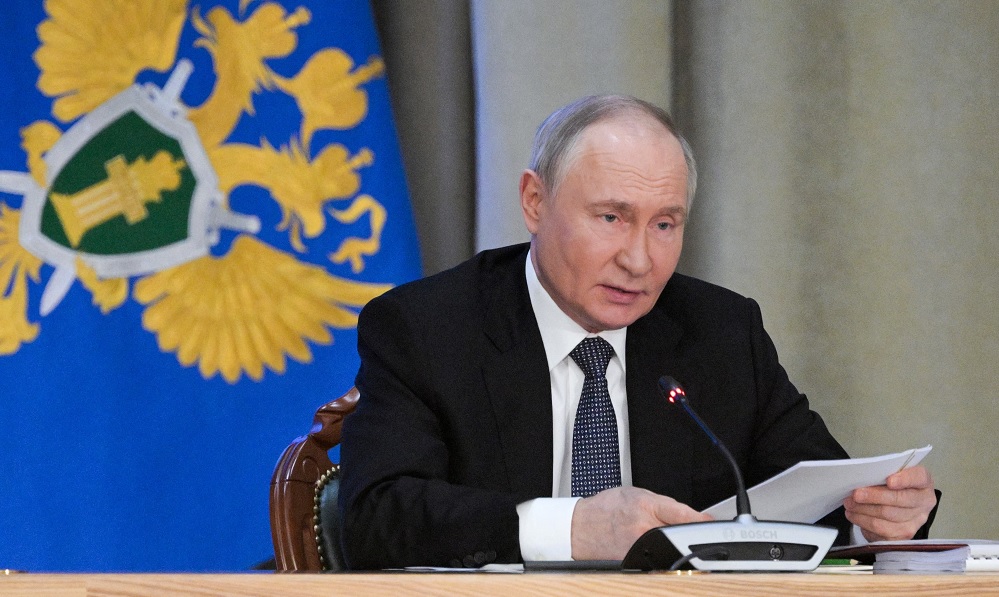
Russian President Vladimir Putin suggested Ukraine be placed under a form of temporary administration to allow for new elections and the signature of key accords to reach a settlement in the war, Russian news agencies reported early on Friday.
Putin’s comments, during a visit to the northern port of Murmansk, come amid U.S. attempts to forge a settlement to the conflict by re-establishing links with Russia and engaging with both Moscow and Kyiv, in separate talks. The Kremlin leader said he believed U.S. President Donald Trump truly wanted peace, Reuters reported.
Russia’s invasion of Ukraine in February 2022 has left hundreds of thousands of dead and injured, displaced millions of people, reduced towns to rubble and triggered the sharpest confrontation for decades between Moscow and the West.
Putin’s suggestion of a temporary administration appeared to address his long-held complaint that Ukraine’s authorities are not a legitimate negotiating partner as President Volodymyr Zelenskiy has stayed in power beyond the May 2024 end of his mandate.
“In principle, of course, a temporary administration could be introduced in Ukraine under the auspices of the U.N, the United States, European countries and our partners,” Putin was quoted as saying in talks with seamen at the port.
“This would be in order to hold democratic elections and bring to power a capable government enjoying the trust of the people and then to start talks with them about a peace treaty.”
He said Trump’s efforts to proceed with direct talks with Russia – in contrast with his predecessor Joe Biden, who shunned contacts – showed the new president wanted peace.
“In my opinion, the newly elected president of the United States sincerely wants an end to the conflict for a number of reasons,” the agencies quoted him as saying.
A White House National Security Council spokesperson, asked about Putin’s remarks on temporary administration, said governance in Ukraine was determined by its constitution and the people of the country.
There was no immediate comment from Ukraine.
European leaders have pressed on with their own efforts, pledging after a meeting in Paris on Thursday to strengthen Kyiv’s army to ensure it was the cornerstone of future security in Ukraine.
France and Britain tried to expand support for a foreign “reassurance force” in the event of a truce with Russia, although Moscow rejects any presence of foreign troops in Ukraine.
UKRAINE REJECTS NOTION OF ILLEGITIMACY
Zelenskiy has rejected any notion questioning his legitimacy, saying Ukraine is barred by law from holding elections under martial law and holding a poll in wartime conditions would in any case prove impossible.
Zelenskiy has repeatedly accused Putin in recent days of wanting to press on with the conflict.
The Trump administration has proposed a new, more expansive minerals deal with Ukraine, according to three people familiar with the ongoing negotiations and a summary of a draft proposal obtained by Reuters.
Trump has said a minerals deal will help secure a peace agreement by giving the United States a financial stake in Ukraine’s future.
In his comments, Putin said Russia was steadily moving forward to achieving the goals it had set out in its Ukraine operation.
Russia, Putin said, was in favour of “peaceful solutions to any conflict, including this one, through peaceful means, but not at our expense”.
“Throughout the entire line of military contact, our troops are holding the strategic initiative,” he said.
“We are gradually – perhaps not as quickly as some might like – but still persistently and with confidence moving towards achieving the goals set out at the beginning of this operation,” the agencies quoted him as saying.
More than three years after launching their full-scale invasion of Ukraine, Russian forces now hold about 20% of the country, with Moscow declaring four regions annexed. Its forces have also recovered much of the territory it initially lost in a Ukrainian incursion last August into its western Kursk region.
Putin praised the efforts in seeking a solution from the BRICS grouping it promotes as an alternative to traditional alliances – singling out China and India for praise.
He said Russia was ready to cooperate with many countries, including North Korea, to help end the war.
Western and Ukrainian sources say more than 11,000 North Korean troops have been sent to bolster Russian forces in the Kursk region, although Moscow has not confirmed this.
Putin said Russia was also ready to work with Europe, but adding that Europe “conducts itself in inconsistent fashion”.
European countries, he said, were trying “lead us around by the nose, but it’s okay, we’ve become used to it. I hope that we won’t make any mistakes based on excessive trust in our so-called partners.”
World
Secretive Chinese network tries to lure fired US federal workers, research shows
Researcher identifies “network of fake consulting and headhunting firms”

A network of companies operated by a secretive Chinese tech firm has been trying to recruit recently laid-off U.S. government workers, according to job ads and a researcher who uncovered the campaign, Reuters reported Wednesday.
Max Lesser, a senior analyst on emerging threats with the Washington-based think tank Foundation for Defense of Democracies, said some companies placing recruitment ads were “part of a broader network of fake consulting and headhunting firms targeting former government employees and AI researchers.”
Little information is publicly available on the four consultancies and recruitment companies allegedly involved in the network, which in some cases shared overlapping websites, were hosted on the same server, or had other digital links, according to Reuters’ reporting and Lesser’s research.
The four companies’ websites are hosted at the same IP address alongside Smiao Intelligence, an internet services company whose website became unavailable during Reuters’ reporting.
Reuters could not determine the nature of the relationship between Smiao Intelligence and the four companies.
The news agency’s attempts to track down the four companies and Smiao Intelligence ran into numerous dead-ends including unanswered phone calls, phone numbers that no longer work, fake addresses, addresses that lead to empty fields, unanswered emails and deleted job listings from LinkedIn.
Lesser, who uncovered the network and shared his research with Reuters ahead of publication, said the campaign follows “well-established” techniques used by previous Chinese intelligence operations.
“What makes this activity significant,” he said, “is that the network seeks to exploit the financial vulnerabilities of former federal workers affected by recent mass layoffs.”
Reuters could not determine if the companies are linked to the Chinese government or whether any former federal workers were recruited.
Asked about the research, three intelligence analysts told Reuters the network appeared to be a prime example of how foreign-linked entities are trying to gather intelligence from staff fired or forced into retirement by President Donald Trump and billionaire tech tycoon Elon Musk’s Department of Government Efficiency.
A spokesperson for the Chinese Embassy in Washington told Reuters in an email that China was unaware of any of the entities allegedly involved in the campaign and Beijing respects data privacy and security.
A White House spokesperson said China was constantly trying to exploit the United States’ “free and open system” through espionage and coercion.
“Both active and former government employees must recognize the danger these governments pose and the importance of safeguarding government information,” the spokesperson said.
One of the companies in the network, RiverMerge Strategies, bills itself on its website as a “professional geopolitical risk consulting company” and posted two since-deleted job listings on its since-removed LinkedIn page in mid-February.
One ad that sought a “Geopolitical Consulting Advisor” with experience with government agencies, international organizations, or multinational corporations, displayed that it had more than 200 applications, according to a screenshot of the LinkedIn post.
The other sought a human resources specialist who could “utilize a deep understanding of the Washington talent pool to identify candidates with policy or consulting experience,” and “leverage connections to local professional networks, think tanks, and academic institutions.”
World
Russian missile attack wounds 88 in Ukraine’s Sumy, officials say
Zelenskiy said Russia was “the only entity prolonging this war and tormenting both our people and the entire world.
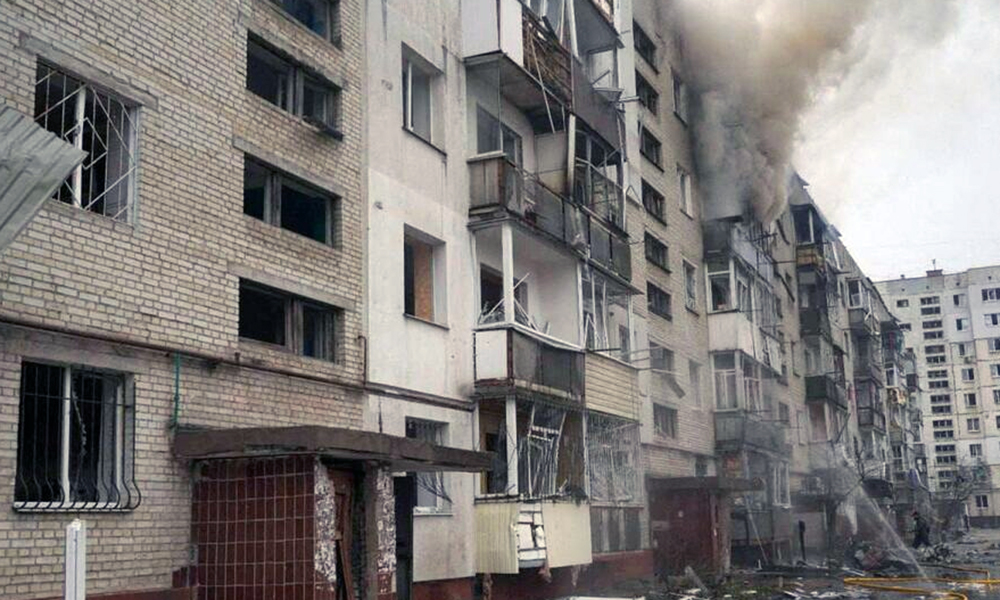
A Russian missile attack hit a densely-populated district of Ukraine’s northeastern city of Sumy, wounding 88 people, including 17 children, on Monday as ceasefire talks, ploughed on, officials said.
Regional governor Volodymyr Artiukh announced the latest casualty toll on national television. He said many more children had escaped injury as they had been evacuated to air raid shelters, Reuters reported.
“They were in the area in a densely-populated area hit by the enemy strike,” Artiukh told the television.
“Two schools fell within the impact zone. I was present when our rescuers cleared the locations where the children were. They were in protective structures. All the children were rescued and evacuated to a safe place.”
Several high-rise residential blocks in the city centre were also damaged, read the report.
Artiukh had earlier spoken in a video that he said was shot at the scene with heavy black smoke, fires and a car with shattered windows in the background. Smoke also rose from the upper floors of a five-storey residential block nearby.
Ukrainian President Volodymyr Zelenskiy deplored the attack in his nightly video address as the latest example of “losses, pain and destruction, something Ukraine never wanted.”
The missile struck the city as Russian and U.S. officials met in Saudi Arabia to discuss a possible ceasefire.
Zelenskiy said Russia was “the only entity prolonging this war and tormenting both our people and the entire world.
“To force Russia into peace, strong measures and decisive actions are needed,” he said. “We are ready to support every strong initiative that makes diplomacy more effective.”
Foreign Minister Adrii Sybiha said Moscow was speaking of peace “while carrying out brutal strikes on densely populated residential areas in major Ukrainian cities.”
“Instead of making hollow statements about peace, Russia must stop bombing our cities and end its war on civilians,” Sybiha said.
Acting Sumy mayor Artem Kobzar said on Telegram an industrial facility was attacked but did not name it.
Sumy, about 30 km (20 miles) from the Russian border, comes under constant drone and missile strikes from Russia.
-

 International Sports4 days ago
International Sports4 days agoIPL 2025: Sunrisers on a batting rampage; triumph over Rajasthan Royals
-

 Latest News4 days ago
Latest News4 days agoEU says girls’ education crucial for Afghanistan’s long-term prosperity
-

 Sport4 days ago
Sport4 days agoACB names Afghanistan A squad for tri-nation series
-
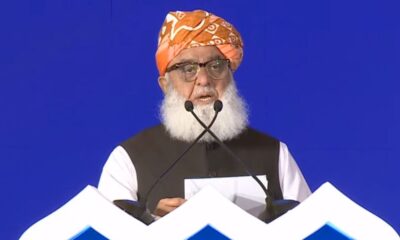
 Latest News5 days ago
Latest News5 days agoPakistan’s mistakes played significant role in rise of terrorism: Maulana Fazl-ur-Rehman
-
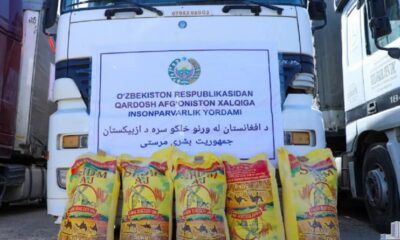
 Latest News4 days ago
Latest News4 days agoUzbekistan sends essential food aid to Afghanistan
-

 International Sports3 days ago
International Sports3 days agoIPL 2025: Last over drama; Ashutosh Sharma clinches win for Delhi Capitals
-

 Sport3 days ago
Sport3 days agoAfghanistan eliminated from Asian Beach Soccer Championship
-
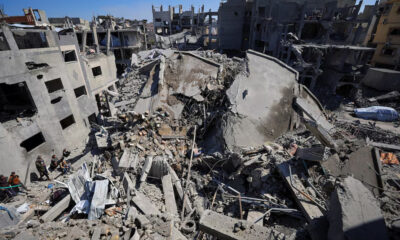
 Regional3 days ago
Regional3 days agoEgypt makes new proposal to restore Gaza truce as Israeli strikes kill 65






